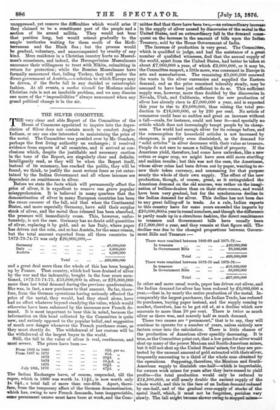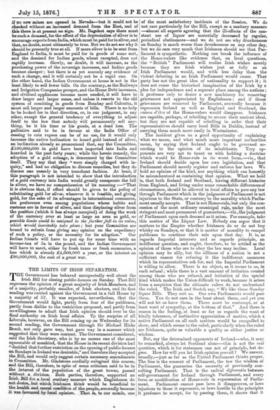1 HE SILVER COMMITTEE. T HE very clear and able Report
of the Committee of the House of Commons appointed to inquire into the depre- ciation of Silver does not contain much to comfort Anglo- Indians, or any one else interested in maintaining the price of the metal. The Committee was presided over by Mr. Goschen, perhaps the first living authority on exchanges ; it received evidence from experts of all countries, and it arrived at con- clusions which, despite the justifiable and necessary caution in the tone of the Report, are singularly clear and definite. Intelligently read, as they will be when the Report itself, instead of its summary, has reached the public, they will be found, we think, to justify the most serious fears as yet enter- tained by the Indian Government and all whose incomes are dependent on remittances in silver.
Before we state the facts which will permanently affect the price of silver, it is expedient to remove one grave popular misapprehension. It is believed in many quarters that the demonetisation Of silver in many European countries has been the causa causans of the fall, and that when the Continental States, and more especially Germany, have sold their surplus stock of silver, and the metal thus released has been absorbed, the pressure will immediately cease. This, however, unfor- tunately, is not the case. Germany has no doubt sold quantities of silver, replacing it by gold, and so has Italy, where paper has driven out the coin, and so has Austria, for the same reason, but the total amount exported from all three countries in 1872-73-74-75 was only £20,000,000,—
Germany ... 48,000,000 Italy ... ... 8,000,000 Austria ... 4,000,000 Total ... 420,000,000
and a great deal more than the whole of this has been bought up by France. That country, which had been drained of silver by the war and the indemnity, bought in the four years men- tioned, 1872-73-74-75, £53,000,000 in silver, or £26,000,000 more than her total demand during the previous quadrennium. She was, in fact, a new purchaser to that amount. So far, there- fore, from the German operations having seriously affected the price of the metal, they would, had they stood alone, have had no effect whatever beyond steadying the value, which would otherwise have been enhanced by the immense new French de- mand. It is most important to bear this in mind, because the information on this head collected by the Committee is quite new, and entirely opposed to the popular belief, and suggestive of much new danger whenever the French purchases cease, as they must shortly do. The withdrawal of her custom will be the withdrawal of the largest buyer in the world. Still, the fall in the value of silver is real, continuous, and most severe. The prices have been
From 1862 to 1866 From 1867 to 1872 1878 1874 1875 July 10th, 1876 62d. per oz. ... 61d. „
seid. „
... 58
9)
The Indian Exchanges have, of course, responded, till the rupee, which in 1860 was worth I s. 1 lfd., is now worth only is. sp., a total fall of more than one-fifth. Apart, there- fore, from the temporary effect of the German demonetisation, which has, owing to new French demands, been inappreciable, some permanent causes must have been at work, and the Com- mittee find that there have been two,—an extraordinary increase in the supply of silver caused by discoveries of 'the metal in the United States, and an extraordinary fall in the demand conse- quent on the increase in the amount of bills upon the Indian Treasury, sold by the Home Government of India.
The increase of production is very great. The Committee, which is qualified to judge, and had the assistance of a great number of qualified witnesses, find that the annual supply of the world, apart from the United States, had better be taken at• about £7,000,000 a year, of which £2,000,000, or it may be, the Committee suspect, a little more, was consumed in Europe in arts and manufactures. The remaining £5,000,000 renewed the waste in the silver currencies and supplied the Eastern demand, and as the price remained tolerably steady, may be assumed to have been just sufficient to do so. This sufficient supply was, however, more than doubled by the discoveries in. Nevada, Utah, and California, where the new production of silver has already risen to £7,000,000 a year, and is expected this year to rise to £9,000,000, thus raising the total pro- duction to £16,000,000, or by 230 per cent. No article of commerce could bear so sudden and great an increase without a fall—coals, for instance, could not bear it—and specially no article which does not increasingly tempt people by its cheap- ness. The world had enough silver for its coinage before, and the consumption for household articles is not increased by cheapness, is possibly even diminished, as the demand for " solid articles " in silver decreases with their value as treasure. People do not care to amass a falling kind of property. If the- American yield, therefore, had come here unbroken, like a new cotton or sugar crop, we might have seen still more startling and sudden results ; but this was not the case, the Americans,. whose silver coins had been driven out by paper, wanting to re- new their token currency, and consuming for that purpose nearly the whole of their own supply. The effect of the new production, though, of course, great, as it extinguished the American demand on the old sources, was rather on the imagi- nation of bullion-dealers than on their store-rooms, and would have been very gradual, but for the synchronous decline In the Indian demand for silver. This decline has not been due to any great falling-off in trade. As a rule, Indian exports to this country have for some years exceeded the imports by £20,000,000 a year in round numbers, and though the-difference- is partly made up in a circuitous fashion, the direct remittances in treasure and Government bills have usually been £17,000,000 a year, and they remain at that figure still. The decline was due to the changed proportions between Govern- ment Bills and Treasure :-
There were remitted between 1868-69 and 1871-72 :- In treasure ... 440,000,000 In Government Bills ... 29,500,000 Total ... 469,500,000
There were remitted between 1872-73 and 1875-76 :--
In treasure ... ... 416,500,000 In Government Bills ... ... 50,500,000 Total ... 467,000,000
In other and more usual words, paper has driven out silver, and the Indian demand for silver has been reduced by £6,000,000 a year,—that is, by nearly the entire production of the metal. In- comparably the largest purchaser, the Indian Trade, has reduced its purchases, buying paper instead, and the supply coming to• market, therefore, has to be got rid of, at a decline which now amounts to more than 20 per cent. There is twice as much silver as there was, and scarcely half as much demand.
These two causes are " permanent," that is to say, they will continue to operate for a number of years, unless entirely new factors come into the calculation. There is little chance of the production of American silver speedily decreasing. It is true, as the Committee point out, that a low price for silver would shut up many of the poorer Mexican and South-American mines, but it will not shut up the United States' mines, for they are pro- tected by the unusual amount of gold extracted with their silver, frequently amounting to a third of the whole sum obtained by the operations. Supposing, therefore, the Mexican and South- American supply to diminish one-half—which is improbable, for owners work mines for years after they have ceased to yield profits—the total production would only be reduced to £12,500,000, or still nearly double the ancient supply of the whole world, and this in the face of an Indian demand reduced by one-half, and of the gradual over-supply of stocks of the metal itself, which, it must not be forgotten, perishes very slowly. The fall might become slower owing to stopped mines- checked without an increased demand from the East, and of this there is at present no sign. Mr. Bagehot says there must be such a demand, for the effect of the depreciation of silver is to encourage exports from India, which must be paid for in silver, and that., no doubt, must ultimately be true. But we do not see why it should be presently true at all. If more silver is to be sent from England to India, it must be paid for in goods of some sort, and the demand for Indian goods, wheat excepted, does not rapidly increase. Slowly, no doubt, it will increase, as the purchasing power of the sovereign increases, and Indian goods become cheaper ; but there is as yet scarcely any evidence of such a change, and it will certainly not be a rapid one. On the other hand, the Indian Government at home is not in the least likely to sell fewer bills. On the contrary,as the Railways and Irrigation Companies prosper, and the Home Debt increases, and civilised appliances become more needed, it will have to draw larger and larger sums, and unless it resorts to the old system of remitting in goods from Bombay and Calcutta, it must sell larger and larger amounts of bills. There is no help to be looked for in that direction, or, in our judgment, in any other, except the general tendency of everything to adjust itself to the law that nobody will permanently sell any- thing, be it his time or his goods, at a dead loss. The palliative said to be in favour at the India Office of ceasing to coin rupees can be of no use, for it would only increase the native inclination to hoard gold instead of silver, an inclination already so pronounced that, say the Committee, £100,000,000 in gold have been imported into India and hoarded in the past forty years; while the heroic remedy, the adoption of a gold coinage, is denounced by the Committee itself. They say that they " were simply charged with in- quiry," and had no obligation to discuss remedies, but they do discuss one remedy in very trenchant fashion. At least, if this paragraph is not intended to show that the introduction of a ,gold currency into India would greatly exasperate the fall in silver, we have no comprehension of its meaning :—"That it is obvious that, if effect should be given to the policy of substituting gold for silver, wherever it is feasible, and giving gold, for the sake of its advantages in international commerce, the preference even among populations whose habits and customs are in favour of silver, and thus displacing silver from the position (which it has always occupied) of doing the work of the currency over at least as large an area as gold, no possible limits could be assigned to the further fall in its value, which would inevitably take place; but your Committee are bound to refrain from giving any opinion on the expediency of such a policy, or the necessity for its adoption." Our Indian friends will have to put .up for some time with an income-tax of 58. in the pound, and the Indian Government will have to meet, either by fresh taxes or fresh economies, a loss which is already £4,000,000 a year, or the interest on £80,000,000, the cost of a great war.































 Previous page
Previous page